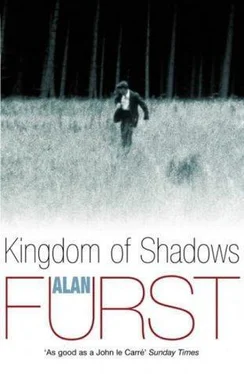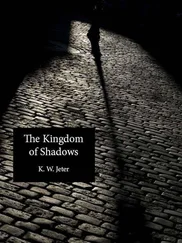Alan Furst - Kingdom of Shadows
Здесь есть возможность читать онлайн «Alan Furst - Kingdom of Shadows» весь текст электронной книги совершенно бесплатно (целиком полную версию без сокращений). В некоторых случаях можно слушать аудио, скачать через торрент в формате fb2 и присутствует краткое содержание. Жанр: Шпионский детектив, на английском языке. Описание произведения, (предисловие) а так же отзывы посетителей доступны на портале библиотеки ЛибКат.
- Название:Kingdom of Shadows
- Автор:
- Жанр:
- Год:неизвестен
- ISBN:нет данных
- Рейтинг книги:5 / 5. Голосов: 1
-
Избранное:Добавить в избранное
- Отзывы:
-
Ваша оценка:
- 100
- 1
- 2
- 3
- 4
- 5
Kingdom of Shadows: краткое содержание, описание и аннотация
Предлагаем к чтению аннотацию, описание, краткое содержание или предисловие (зависит от того, что написал сам автор книги «Kingdom of Shadows»). Если вы не нашли необходимую информацию о книге — напишите в комментариях, мы постараемся отыскать её.
Kingdom of Shadows — читать онлайн бесплатно полную книгу (весь текст) целиком
Ниже представлен текст книги, разбитый по страницам. Система сохранения места последней прочитанной страницы, позволяет с удобством читать онлайн бесплатно книгу «Kingdom of Shadows», без необходимости каждый раз заново искать на чём Вы остановились. Поставьте закладку, и сможете в любой момент перейти на страницу, на которой закончили чтение.
Интервал:
Закладка:
He had an awful headache the next morning. When he left the apartment, taking the rue Mabillon toward the river, Ilya emerged from a doorway and fell in step with him. He’d changed the green overcoat for a corduroy jacket, in more or less the same shape as the coat.
“Will your friend see me?” he said, his voice urgent.
“He will.”
“Everything has changed, tell him that. Litvinov is finished-it’s a signal to Hitler that Stalin wants to do business.” Litvinov was the Soviet foreign minister. “Do you understand it?” He didn’t wait for an answer. “Litvinov is a Jewish intellectual-an old-line Bolshevik. Now, for this negotiation, Stalin provides the Nazis with a more palatable partner. Which is perhaps Molotov.”
“If you want to see my friend, you’ll have to say where and when.”
“Tomorrow night. Ten-thirty. At the Parmentier Metro stop.”
A deserted station, out in the 11th Arrondissement. “What if he can’t come?” Morath meant won’t and he sensed Ilya knew it.
“Then he can’t. And I either contact you or I don’t.”
Moving quickly, he turned, walked away, disappeared.
For a time, Morath considered letting it die right there. Suddenly, Ilya knew things. How? This wasn’t hiding in a room with a sack of oats. Could he have been caught? Then made a deal with the NKVD? But Polanyi had said leave it to me. He was no fool, would not go unprotected to a meeting like this. You have to let him decide, Morath thought. Because if the information was real, it meant Hitler didn’t have to worry about three hundred Russian divisions, and that meant war in Poland. This time, the British and the French would have to fight, and that meant war in Europe.
When Morath reached the Agence Courtmain, he called the legation.
“A fraud,” Polanyi said. “We are being used-I don’t exactly understand why, but we are.”
They sat in the backseat of a shiny black Grosser Mercedes, Bolthos in front with the driver. On the sixth day of May, benign and bright under a windswept sky. They drove along the Seine, out of the city at the Porte de Bercy, headed south for the village of Thiais.
“You went alone?” Morath said.
Polanyi laughed. “A strange evening at the Parmentier Metro-heavyset men reading Hungarian newspapers.”
“And the documents?”
“Tonight. Then adieu to comrade Ilya.”
“Maybe it doesn’t matter now.” Litvinov had resigned two days earlier.
“No, we must do something. Wake the British up-it’s not too late for the diplomats. I would say that Poland is an autumn project, after the harvest, before the rains.”
The car moved slowly through the village of Alfortville, where a row of dance halls stood side by side on the quai facing the river. Parisians came here on summer nights, to drink and dance until dawn. “Poor soul,” Polanyi said. “Perhaps he drank in these places.”
“Not many places he didn’t,” Bolthos said.
They were on their way to the funeral of the novelist Josef Roth, dead of delirium tremens at the age of forty-four. Sharing the backseat with Polanyi and Morath, a large, elaborate wreath, cream-colored roses and a black silk ribbon, from the Hungarian legation.
“So then,” Morath said, “this fugitive business is just a ruse.”
“Likely it is. Allows the people who sent him to deny his existence, maybe that’s it. Or perhaps just an exercise in the Soviet style-deceit hides deception and who knows what. One thing that does occur to me is that he is being operated by a faction in Moscow, people like Litvinov, who don’t want to do business with Hitler.”
“You will take care, when you see him again.”
“Oh yes. You can be sure that the Nazi secret service will want to keep any word of a Hitler/Stalin negotiation a secret from the British. They would not like us to be passing documents to English friends in Paris.” He paused, then said, “I’ll be glad when this is over, whichever way it goes.”
He seemed tired of it all, Morath thought. Sombor, the Russians, God only knew what else. Sitting close together, the scent of bay rum and brandy was strong in the air, suggesting power and rich, easy life. Polanyi looked at his watch. “It’s at two o’clock,” he said to the driver.
“We’ll be on time, your excellency.” To be polite, he sped up a little.
“Do you read the novels, Nicholas?”
“ Radetzky March, more than once. Hotel Savoy. Flight Without End. ”
“There, that says it. An epitaph.” Roth had fled from Germany in 1933, writing to a friend that “one must run from a burning house.”
“A Catholic burial?” Morath said.
“Yes. He was born in a Galician shtetl but he got tired of being a Jew. Loved the monarchy, Franz Josef, Austria-Hungary.” Polanyi shook his head. “Sad, sad, Nicholas. He hated the emigre life, drank himself to death when he saw the war coming.”
They arrived at Thiais twenty minutes later, and the driver parked on the street in front of the church. A small crowd, mostly emigres, ragged and worn but brushed up as best they could. Just before the Mass began, two men wearing dark suits and decorations carried a wreath into the church. “Ah, the Legitimists,” Polanyi said. Across the wreath, a black-and-yellow sash, the colors of the Dual Monarchy, and the single word Otto -the head of the House of Habsburg and heir to a vanished empire. It occurred to Morath that he was witness to the final moment in the life of Austria-Hungary.
In the graveyard by the church, the priest spoke briefly, mentioned Roth’s wife, Friedl, in a mental institution in Vienna, his military service in Galicia during the war, his novels and journalism, and his love of the church and the monarchy. We all overestimated the world, Morath thought. The phrase, written to a friend after Roth fled to Paris, was from an obituary in the morning paper.
After the coffin was lowered into the grave, Morath took a handful of dirt and sprinkled it on top of the pinewood lid. “Rest in peace,” he said. The mourners stood silent while the gravediggers began to shovel earth into the grave. Some of the emigres wept. The afternoon sun lit the tombstone, a square of white marble with an inscription: Josef Roth
Austrian Poet
Died in Paris in Exile
On the morning of 9 May, Morath was at the Agence Courtmain when he was handed a telephone message. Please call Major Fekaj at the Hungarian legation. His heart sank a little-Polanyi had told him, on the way back from Thiais, that Fekaj now sat in Sombor’s office, his own replacement due from Budapest within the week.
Morath put the message in his pocket and went off to a meeting in Courtmain’s office. Another poster campaign-a parade, a pageant, the ministries preparing to celebrate, in July, the hundred and fiftieth anniversary of the revolution of 1789. After the meeting, Courtmain and Morath treated a crowd from the agency to a raucous lunch in an upstairs room at Laperouse, their own particular answer to the latest valley in the national morale.
By the time he got back to the avenue Matignon, Morath knew he had to call-either that or think about it for the rest of the day.
Fekaj’s voice was flat and cold. He was a colorless man, precise, formal, and reserved. “I called to inform you, sir, that we have serious concerns about the well-being of his excellency, Count Polanyi.”
“Yes?” Now what.
“He has not been seen at the legation for two days and does not answer his telephone at home. We want to know if you, by any chance, have been in contact with him.”
“No, not since the sixth.”
“Did he, to your knowledge, have plans to go abroad?”
“I don’t think he did. Perhaps he’s ill.”
Читать дальшеИнтервал:
Закладка:
Похожие книги на «Kingdom of Shadows»
Представляем Вашему вниманию похожие книги на «Kingdom of Shadows» списком для выбора. Мы отобрали схожую по названию и смыслу литературу в надежде предоставить читателям больше вариантов отыскать новые, интересные, ещё непрочитанные произведения.
Обсуждение, отзывы о книге «Kingdom of Shadows» и просто собственные мнения читателей. Оставьте ваши комментарии, напишите, что Вы думаете о произведении, его смысле или главных героях. Укажите что конкретно понравилось, а что нет, и почему Вы так считаете.












